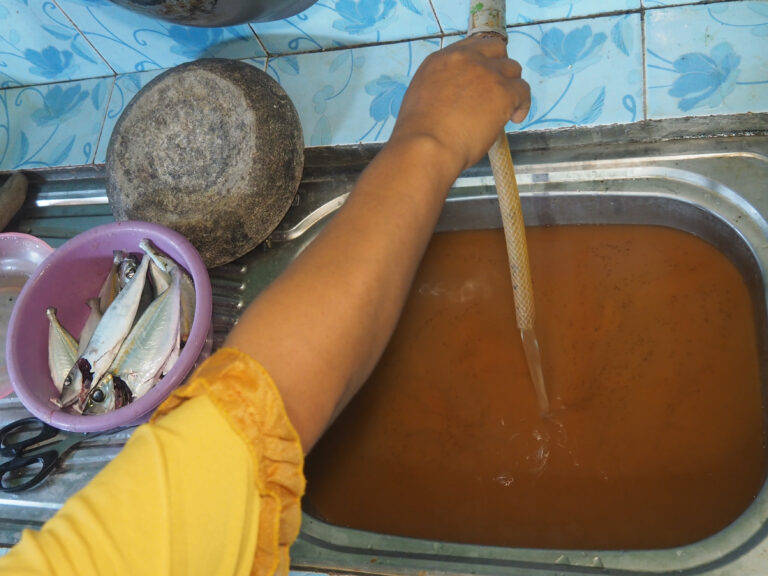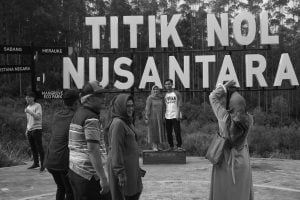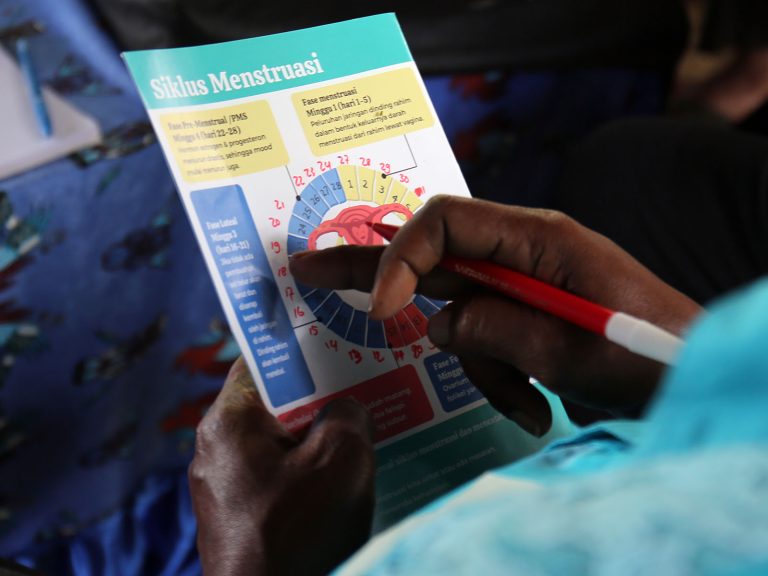In pursuit of improved economy and labor welfare, a significant number of Indonesians seek employment in Malaysia as domestic workers. But loopholes in regulations have made them vulnerable to exploitation and illegal procedures, oftentimes from unscrupulous employment agencies. Yet, former domestic workers become activists who collectively strive for fairer and more just recruitment and employment practices.
In 2018, Yati, who requested anonymity, was promised a job as a beautician in Johor, the southernmost state of Malaysia, by an acquaintance she’d only just met.
Struggling to make ends meet and to enrol her children into secondary school in Jakarta, Yati was desperate enough.
Asked to first arrive in Malaysia on a tourist visa, Yati did not know that she was being trafficked into the country to work as a domestic worker. But it was too late.
Upon arrival, she was not allowed to have a phone, nor have a day off. On top of that, her agent told her that her salary would be half the promised amount of RM2,000 (US$430). Even after working for two years with her employer, she has not received any of this amount.
“The agent said it’s normal to potong gaji (have one’s salary cut) over here,” Yati said. “But there was no written contract. I have no way of turning back now.”
Yati’s story is not unique.
Despite filling the labor gap in Malaysia’s domestic service and contributing to both countries’ economies through money remitted home with an average of US$9.8 billion from 2015 to 2019, domestic workers are often left behind and continue to experience little protection rights, facing a range of systemic challenges that begin at the recruitment process. While both countries continue to seek a more integrated process, there is much to be done in the law and policies to improve the recruitment process and make migration affordable for all.
Precarious Work in Malaysia
Malaysia remains the top country of destination for Indonesian migrant workers, where Indonesians form the largest number in the domestic sector in Malaysia. As of January, there are 399,827 Indonesian migrant workers in Malaysia. Of that number, according to Malaysia’s Human Resources Ministry, 63,323 work as domestic workers. The majority of the rest work in agricultural (palm plantations) and construction sectors.
Women continue to form the bulk of Indonesian migrant workers in the domestic work sector, accounting for 65 percent of the latter in April 2023. Most who sign up for domestic work do so for financial reasons, such as to support their families back home or send their children to school.
In Malaysia, the recruitment of domestic workers follows a strict and regulated process that is often governed by bilateral labour agreements between Indonesia and Malaysia.
According to the Malaysian Immigration Department, employers must submit an application to hire a foreign domestic worker that includes a copy of their identification card, a letter of employment, and a contract of employment. The recruitment agencies then match the employer with a suitable worker and arrange for their travel to Malaysia. Once the worker arrives, they undergo a medical examination and receive training on their rights and responsibilities under Malaysian law.
While these regulations and requirements are in place, Malaysia’s labor laws under the First Schedule of the Employment Act 1955 continue to exclude domestic workers from rest days, stipulated work hours and conditions of service and termination. These lack of legal protection can thus leave domestic workers vulnerable to exploitation.
One way in which this can occur is through the expensive costs of hiring that is borne by both employers and employees. For Yati, she had to borrow money from her family and peers before she could even travel to Malaysia and pay her agent RM1,000 to travel. However, upon arriving in Malaysia, the agent asked for more money for her to continue staying.
“The problem is structural,” said Pamungkas A. Dewanto, a PhD candidate in social anthropology at Vrije Universiteit Amsterdam.
The high cost of becoming a domestic worker has given ways for third party loan providers to offer “credit schemes” where workers commit to it and enter a debt trap to pay back.
Indonesian domestic workers who seek employment in Malaysia rely on agents or recruiters to enter the country. However, agents may charge workers exorbitant fees for their services, including recruitment, transportation and documentation expenses. Due to financial constraints, many workers are unable to pay these fees upfront, leading them to borrow money from the agents or other sources.
“Unregistered agencies or sponsors (we sometimes call them, ‘calo’ or ‘taikong’) are essential actors in migration industries,” Dewanto said.
Yet cost and fees for recruitment and placement are difficult to manage, according to Dewanto. A lack of regulation and transparency in the recruitment process has also allowed unscrupulous agents to exploit and deceive workers, often by charging exorbitant fees for their services.
“They monopolize knowledge regarding recruitment and placements. They bridge migrants and official recruitment agencies,” he added. ”Workers in the destination [become] highly vulnerable as they will need to endure any working conditions to pay their debt or release their family from another debt trap.”
At the same time, domestic workers get penalized and compounded with even higher fees for wanting to change employers or jobs. This has created a situation where many workers are forced to take out loans or sell assets to cover these fees, leaving them in debt bondage and vulnerable to further exploitation.
When Yati attempted to switch jobs, the agent sought a RM800 penalty, which increased to RM2,000 in time, requiring her family back in Indonesia to fork the amount out.
“I was sold again to another agent when I could not pay the fees completely,” she said, adding that she was threatened to do sex work. It took two years before she managed to find a suitable employer who hired her as a cleaner.
According to Dewanto, even as workers depart their home country, they already carry the heavy burden of debt. This ends up becoming a form of control as workers are effectively trapped in a cycle of debt for extended periods, compelling them to work under exploitative conditions to repay the debt.
The case of 26-year-old Adelina Lisao in 2018 prompted outrage over the practice of debt bondage during recruitment when she was found murdered in her employer’s home in Penang, Malaysia, after being subjected to severe exploitation and abuse. Reports indicate that Lisao had been in Malaysia for over two years and had accumulated significant debts to the recruitment agency, which included exorbitant fees and expenses. Her employers reportedly withheld her salary to repay the debts, effectively trapping her in a cycle of debt bondage.
The issue is compounded by the fact that Indonesia currently lacks effective regulations that ensure the welfare of its domestic workers abroad. As a response, local non-profits in Malaysia and Indonesia have intensified their advocacy for dedicated legislation to protect their rights. Timed with Indonesia’s national day in August, domestic workers and activists organized a hunger strike to press the House of Representative for legislative reforms.
“For migrants who departed with a lot of problems already at home, this debt-trap situation and abusive, exploitative working conditions will stimulate workers to abscond from their work and find better pay, and better work treatment. This is just one home-based reason why Malaysia maintains the number of undocumented workers,” said Dewanto.
“Migrant workers migrate no matter how precarious they will be in their destination.”
Navigating a Tedious and Non-Transparent Process
Part of the challenge is in the long process, said Fiona Low, President of Malaysia National Association of Employment Agencies (PIKAP), an NGO that helps to monitor and deliver guidelines to employers on safe hiring practices. According to Low, employment agencies can take a minimum of 3 months to process a direct case, and more if a case requires reprocessing.
In March, it was found that while there were 65,850 official job requests for Indonesian domestic workers in Malaysia through the embassy, only 3,150 employment contracts were finalized while the rest of the applications were abandoned. Indonesia’s ambassador to Malaysia, Hermono, expressed concern that the abandoned applications meant the employers had recruited workers through illegal means.
Consequently, both governments have attempted to reevaluate current hiring procedures to make agency fees more affordable—such as lowering the capped fee from RM15,000 to RM8,000 per person.
Still, the reason many employers end up seeking undocumented workers, according to Low, may be to avoid the hassle.
“The major root cause is [that] illegal supply and demand still exist. If [there is] no illegal supply (from Indonesia), no illegal demands can be fulfilled,” she said. “[The] demand for illegals means paying lower salary, [where employers] can control the freedom of the worker.”
“[By] going through the correct and legal way,” she said, “abuse [can] be avoided.”
Once employed, workers often face long working hours, minimal time off, and inadequate living conditions. In some cases, they may even face physical or emotional abuse at the hands of their employers.
“In situations of abuse, domestic workers prefer to run away,” said Sriarti, the central administrator and treasurer of the Indonesia-based Keluarga Besar Buruh Migran Indonesia (Kabar Bumi), former domestic worker turned activist.
At Kabar Bumi, Sriarti mediates issues between domestic workers and the agents on disputes regarding their recruitment and employment. Every month, she handles about 30 cases in Ponorogo alone.
Aside from withheld salary—the majority of cases dealt by Kabar Bumi revolve around the issue of withheld documents. “Before departing the country, domestic workers must present their documents such as marriage certificate, to the agents.”
“In some cases, these documents are not returned to the domestic workers, even upon their return.”
To escape her own abusive situation, Sriarti, who worked as a domestic worker in Malaysia in 1997, divulged that she had to secretly take her passport from her employer’s bag and leave in the middle of the night.
“It felt like I was committing a crime by taking my own passport back.”
Sriarti underlined that one of the most significant challenges faced by Indonesian domestic workers based on her work with Kabar Bumi is the lack of transparency in the employment contract during the recruitment process. Many recruitment agencies use deceptive tactics to lure workers into signing contracts, such as promising higher wages and better working conditions that are not delivered upon arrival.
Sriarti observed how domestic workers often do not understand the contents of the agreement as they are either concealed, or written in English with no Indonesian translation. Domestic workers are also sometimes rushed to sign the contract.
In one instance while renewing her contract in Malaysia, Sriarti saw that her signature had been forged.
“Even for me—I still don’t know to this day what my work contract entailed. This is problematic. Already workers are considered commodities,” Sriarti said. “It should be compulsory for domestic workers to be consulted on the terms of the employment agreement—just as it is for other forms of employment.”
Improving Recruitment Channels
Discussions are ongoing between Indonesian and Malaysian governments to improve the hiring process of domestic workers into the country.
However, new hiring flows for domestic workers are still works in progress. The Maid Online System (SMO), which had been used as the main portal for hiring Indonesian domestic workers, had been plagued by loopholes that inadvertently facilitated trafficking—where it required new recruits to first be in Malaysia on a one-month tourist pass before converting their visa into a work permit.
As a result, in July 2023, a temporary labor freeze was imposed by the Indonesian government, owing to the fact that the Malaysian Immigration Department continued to use the SMO online recruitment system.
Further attempts to improve the recruitment process were made with a more integrated recruitment channel known as the One Channel System (OCS). In April 2022, a memorandum of understanding (MOU) on the Recruitment and Protection of Indonesian Domestic Workers was inked between the two countries, which banned the use of the SMO portal and made it compulsory for all applications to be processed through the new OCS.
Through the bilateral agreement, hiring costs were also ironed out with the introduction of the new maximum recruitment fee of RM15,000 borne by employers and that domestic workers from Indonesia should be paid a minimum monthly wage of RM1,500.
The Malaysian human resource minister V. Sivakumar also expressed a desire to reduce the continuous reliance on recruitment agencies, as it adds up to the hiring costs, which he said is high compared to other countries.
“The country has ‘multilevel recruitment’,” he told the media, “where, for example, the domestic workers are brought from one rural area and may go through several agencies before arriving in our country, so the cost becomes high.”
“With the compulsion of going through an agent—the cheapest to process new applications can be as low as RM50. But for some others, it can go up to RM15,000,” said Lin, a domestic worker who has worked in Malaysia for 15 years, who requested anonymity. “The Indonesian side has no limit as to how much an agency can take.”
Lin first directly engaged with her employer and the embassy. But it was only since 2020 that she had a written contract with her agent.
“We hope that we do not have to work through agents. Because agencies burden us. They take our time and money. This process can be the reason many domestic workers decide to enter undocumented—and employers, too, prefer not to do contracts because of this hassle.”
Affordable and Respectable Migration for All
Like Lin, Sriarti and non-profits like Kabar Bumi hoped for an independent way of managing their passports, permit applications themselves.
While the MOU between the two governments reflect a good opportunity to shed light on the protection of domestic workers abroad, Sriarti opined that more needs to be done in terms of managing the expensive fees that domestic workers are faced with—and reducing third-party agents.
Ultimately, activists like herself hope that both governments can make migration affordable and respectable for all domestic workers.
“Domestic workers have to choose between entering the country via an agent—and having their salaries cut due to the expensive fees—or entering as tourists and then turning undocumented.”
“Both systems expose us to exploitation, all the way from Indonesia,” Sriarti said. “There is still more to be done in both countries. I know my work is not done.”
*Pseudonyms have been used to protect the identity for fear of reprisal
This story is supported by the Asia Pacific Forum on Women, Law and Development (APWLD) Media Fellowship on Migration and Migrant Women’s Human Rights
Editor: Evi Mariani











